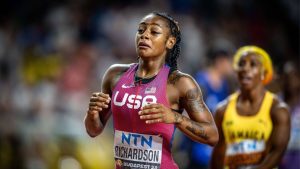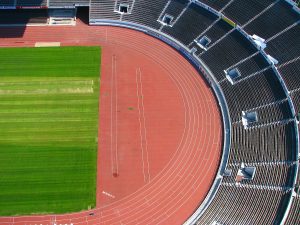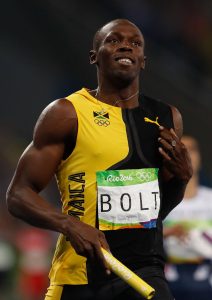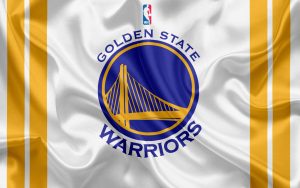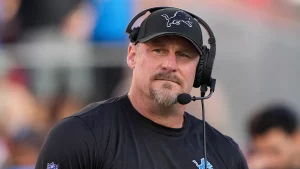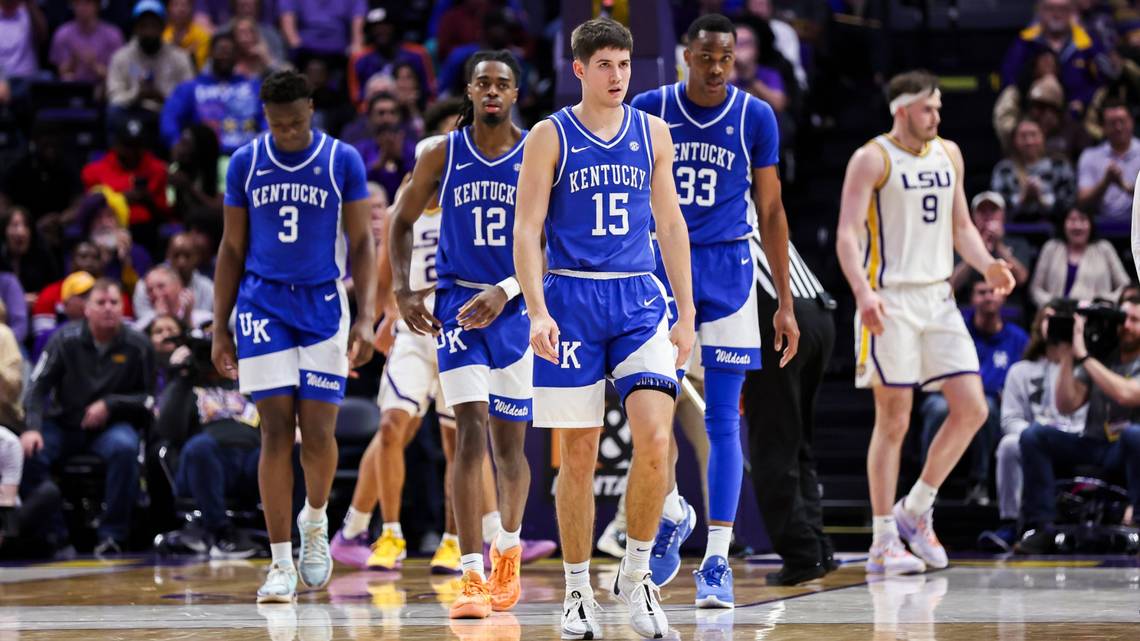

Terrence Shannon Jr. has been charged with rape. He sued to keep playing and now leads Illinois in its NCAA run.
The Athletic has live coverage of UConn vs. Illinois in men’s March Madness Elite 8 play.
Late Sunday afternoon, in between rounds of confetti showers at Minneapolis’ Target Center, Terrence Shannon Jr. took center stage. The fifth-year guard for Illinois’ men’s basketball team had been voted the most outstanding player of the Big Ten tournament, which his team just won. Now was the moment to claim his prize. Shannon nudged past elated teammates wearing championship hats and T-shirts on a temporary dais, took a trophy off a table and smiled as he cradled it near his waist.
A couple hours earlier, a less exultant scene played out.
Shannon toed the free-throw line early in the title game against Wisconsin. The arena was relatively muted. Members of the Badgers’ pep band, seated behind the basket, directed a chant at Shannon while he prepared to shoot. “No means no! No means no!” they shouted. Officials, including one from the Big Ten Conference, approached the band and ordered them to stop. They obliged. A pocket of Wisconsin fans nevertheless repeated the chant the next time Shannon was at the line.
The dynamic will now have a national audience during the NCAA Tournament. The Fighting Illini are a surging No. 3 seed in the East Region, and Shannon, a first-team all-league performer, is their best player. He’s also out there only because he successfully sued the university to end a suspension levied after he was arrested and charged with rape in Douglas County, Kansas, in December.
Shannon has not spoken publicly about the case since charges were filed, on advice from legal counsel. That isn’t expected to change this week in Omaha, Neb., where the Illini are headed for a first-round matchup with Morehead State.
“I’m the basketball coach, and a lot of this stuff was put in play by our university, the courts, and I’m not going to consume myself with it,” Illinois coach Brad Underwood said after the Big Ten tournament championship game. “I said when he was suspended, I was going to coach the guys in the locker room. He’s in the locker room. I’m going to coach him.”
On Dec. 5, prosecutors charged Shannon, 23, with one count of rape or an alternative count of sexual battery after an alleged incident that occurred while visiting Lawrence, Kansas, for a Sept. 8 football game. A woman told police that she was at a bar early Sept. 9 when she was summoned by a man, who grabbed her buttocks, reached under her skirt and touched her sexually, according to an investigative report. She later identified Shannon from an online team roster.

“Terrence is innocent of these charges, and he intends to take his case to trial,” Mark P. Sutter, Shannon’s lawyer, said in a statement.
After an arrest warrant was issued, Shannon turned himself in to authorities on Dec. 28, was released on $50,000 bail and returned to Illinois. A day later, citing athletic department policy for student-athlete misconduct, Illinois then suspended Shannon from all team activities. “In moments like this, we have to understand that basketball must take a back seat,” Illinois athletic director Josh Whitman said at a Dec. 29 news conference. “We have an obligation here as a university to take allegations such as these incredibly seriously.”
Five days after he was suspended, Shannon filed a letter with Illinois’ student-athlete conduct panel. “As to the criminal charges against me, I am declaring my innocence, as I did back in September,” he wrote, before noting he continued to cooperate in the legal process and that his “day in court” likely would not take place until after the NBA Draft. “The harm that I will suffer from an immediate suspension can never be undone, and I will never have this opportunity to further my collegiate career or fulfill my lifelong dream to play in the NBA,” Shannon wrote.
On Jan. 8, Shannon’s attorneys filed a lawsuit against the University of Illinois Board of Trustees, seeking a temporary restraining order against the school in an attempt to be reinstated to the team. Eleven days later, U.S. District Court Judge Colleen Lawless ruled the school violated Shannon’s civil rights with the suspension that would cause Shannon “irreparable harm,” depriving him of “protected property interests” without due process. Those interests, she wrote, include prospects of being an NBA Draft lottery pick this summer and earning money on potential endorsements allowed by the NCAA’s name, image and likeness rules.
With the ruling, the school reinstated Shannon “to full status” while the university student conduct process and criminal case proceeded, per a statement from associate chancellor Robin Kaler. It also specified Underwood “was instructed to treat Mr. Shannon as he would any other member of the team in good standing and not limit participation based on the involved allegations.”
A preliminary hearing set for February was delayed until May 10 in Douglas County after the court had a scheduling conflict.
Shannon missed six games during his suspension. Illinois won four, and one of the losses was on the road to eventual conference regular-season champion Purdue. From personnel and personal standpoints, the Illini adjusted. “It was never distracting for any of us, in my opinion,” forward Coleman Hawkins said of Shannon’s legal issues.
Shannon’s average of 23 points per game ranked third in the nation as of Monday. He scored a tournament single-game record 40 against Nebraska in the Big Ten semifinals. He also regularly defends the opponent’s top scoring option.
“We all hoped he would join us again, but honestly, we had talked about it, and we had expected him not to play with us anymore,” guard Marcus Domask said. “That was kind of our mindset. So when he came back, it was just a huge bonus for us.”
“We came together as a team and decided that it’s not going to affect our season in a bad way,” forward Luke Goode said. “We did a great job doing that. We were able to keep that momentum when he came back and now we’re going full gear.”
The crowd hostility in Minneapolis was nothing new. Northwestern fans yelled “Guilty” and “No means no” throughout Shannon’s first road game back after the suspension. Maryland and Wisconsin home crowds did likewise during regular-season matchups. A repeat in the postseason was probably inevitable. Whether it occurs in the neutral-site gyms of the NCAA Tournament, and whether the nation hears it via the television broadcast, remains to be seen. An email to CBS regarding any plan in the event of loud chants directed at Shannon inside CHI Health Center Omaha, or elsewhere, was not answered.
Whitman, the athletic director, has not addressed Shannon’s legal issues since that late December news conference. Asked by The Athletic if the school had any discussions about altering its misconduct policy to avoid lawsuits in the future, Whitman declined to answer. Underwood has not shied away from most questions about his leading scorer, acknowledging that Shannon’s legal situation is “serious” on multiple occasions during the Big Ten tournament. Asked how he feels about having to play Shannon, given the criminal charges, Underwood declined comment but then added: “I got no choice in that.”
Shannon didn’t appear during open locker room sessions at the Big Ten tournament; league protocol requires all healthy players to participate. The expectation is that Shannon will remain unavailable during the NCAA Tournament.
On Monday, Shannon shared two pictures of himself from the Big Ten tournament championship celebration, taken not long after Illinois fans serenaded him with “M-V-P” chants that competed with less flattering jeers from Wisconsin faithful.
He expressed his appreciation for Illini Nation and added, “Let’s make this run.”


